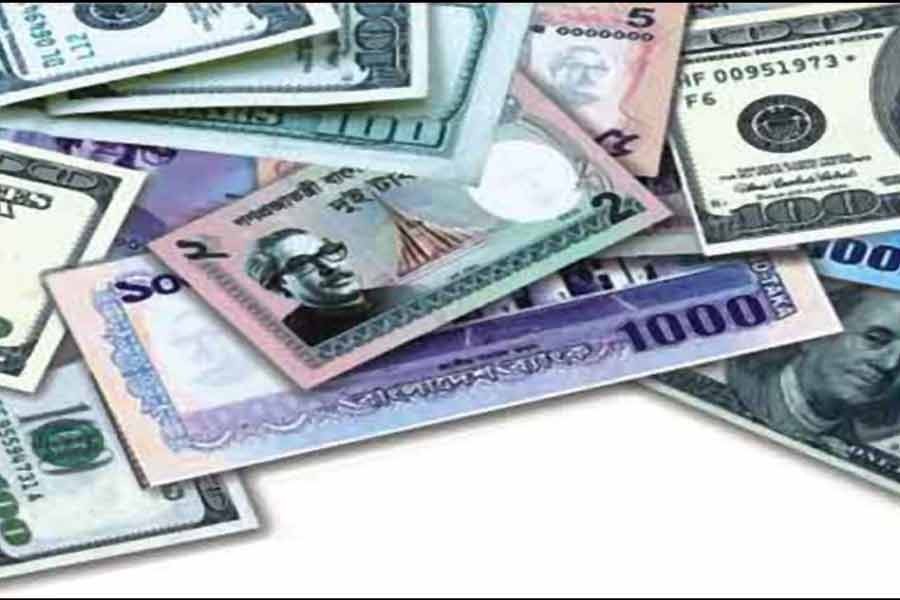A business firm needs recurring money for which it can arrange loans from banks or other sources. Owners can also inject money as capital to meet the requirements. In the same way, an economy needs recurring funds which come either from tax collection or loans. During Covid-19, the economic activities were stalled, resulting in supply shocks in the global trade. Consequently commodity markets become jittery. Domestic commodity market is manageable to some extent but external trade requires international currencies.
Trade is seen as the engine of economic progress. With earning from trade, Bangladesh is in transition from its LDC status. But it faces challenges in managing external transactions in the post-Covid-19 phase of economic turnaround. External economic activities are maintained by international currencies, the flows of which depend on exports, remittance, investment, loans and grants. Inflows from exports and remittance are major sources to meet the needs of current external payments, imports in particular. There is a trade deficit of 24.91 billion US dollar up to March of 2022. Current account deficit stands at US$14.07 billion. During the nine-month period of financial year 2021-2022, monthly average import as per balance of payments statement is $6.84 billion. On the other hand, export is recorded at $4.07 billion. The deficit is $2.77 billion which is supported by monthly remittances of $1.7 billion. But it is not enough considering other payments of services, resulting in monthly average deficit of current account balance of $1.56 billion.
Current account deficit is an indication of more expenses on account of consumption and capital expenditure than on income. It is a good sign if investment is made in import of capital machinery because it will augment income in the future. Up to March of 2022, the country's forex reserve was more than US$44 billion. Recently, depreciation of Taka has lead to an increase in import payments. But insider information indicates each greenback is being traded more than what is officially declared for sales and purchases.
True, depreciation of Taka supports foreign currency earners but costs more for those needing to make outward payments. The Bangladesh Bank (BB) on May 29 of 2003 declared exchange rate floating, price of which should be set on interactions of demand and supply. Then how can price of dollar be depreciated officially? The simple answer is that the central bank intervenes in foreign exchange market in different ways, either by selling and buying or by dictating exchange rates without documentation. To contain the value of Taka, the central bank is now busy with imposing restriction on opening letters of credit for import. Banks are asked to take specified cash margin in this regard excepting imports for selective sectors and items. The restrictions may work as an alternative to reducing imports without erecting tariff walls to a new height.
What would be the situation if the BB had injected sufficient greenback to the market? Definitely market would have eased. Should this be done? This is another question. Exchange rate should reflect its fair value. The rate at which transactions are executed is known as nominal exchange rate. There is another terminology known as real exchange rate calculated by the central bank on consideration of macro variables of trading-partner countries. A report carried in a national daily indicates that Tka is still overvalued. To remain in external transactions, seamless inflows are needed for outward payments. Any disturbance will jeopardise the overall situation. Foreign currency earners particularly exporters and wage earners appear to be happy with Taka depreciation. Export sectors are found to rebound with commitment for new investment. They should not be disturbed by realignment of exchange rate. This may be the reason why central bank is not coming up with sufficient support for the market. The present situation needs to be managed prudently. The BB needs to focus on it.
As part of judicious management, export proceeds should strictly be monitored so that their repatriation is not delayed for better exchange rates. Foreign exchange-dealer banks need to be brought under strict screening so that they cannot manipulate market. Local books and foreign books of accounts should be adjusted regularly. It is observed that there is a mismatch between demand and supply because of flexible market. The central bank should minimise the gap. In addition, cost savings approaches need to be introduced for the time being. To achieve this goal, online purchases of digital entertainment contents by individual international cardholders should be disallowed.
Bangladesh should not be compared with Sri Lanka. External sector management of Bangladesh is on the right trajectory. For export trade, exchange rate will be one of the single tools on full-fledged graduation from LDC status. The prevailing situation is shaping export sectors competitive globally with better margin for Taka domestically. More investment in this sector is expected with time, giving rise to creation of employment. In Asian crisis of the 90's in the last century and global financial crisis of 2008, Bangladesh did not suffer. It has learned a lot since late 2021. This experience can be used for managing external sectors.
Exchange rate will not go for freefall. It has already been realigned well. Now it is time to stabilise the position.


